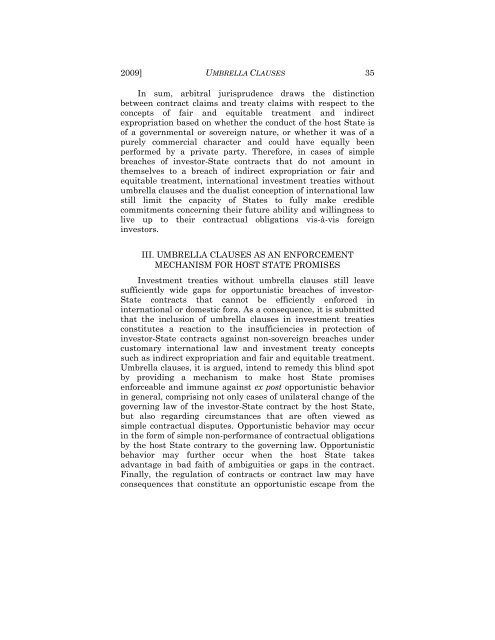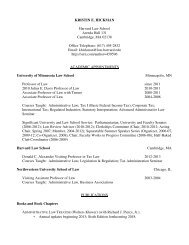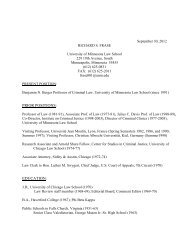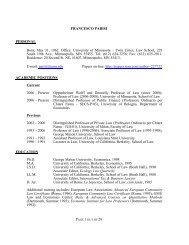Enabling Private Ordering - the University of Minnesota Law School
Enabling Private Ordering - the University of Minnesota Law School
Enabling Private Ordering - the University of Minnesota Law School
You also want an ePaper? Increase the reach of your titles
YUMPU automatically turns print PDFs into web optimized ePapers that Google loves.
2009] UMBRELLA CLAUSES 35<br />
In sum, arbitral jurisprudence draws <strong>the</strong> distinction<br />
between contract claims and treaty claims with respect to <strong>the</strong><br />
concepts <strong>of</strong> fair and equitable treatment and indirect<br />
expropriation based on whe<strong>the</strong>r <strong>the</strong> conduct <strong>of</strong> <strong>the</strong> host State is<br />
<strong>of</strong> a governmental or sovereign nature, or whe<strong>the</strong>r it was <strong>of</strong> a<br />
purely commercial character and could have equally been<br />
performed by a private party. Therefore, in cases <strong>of</strong> simple<br />
breaches <strong>of</strong> investor-State contracts that do not amount in<br />
<strong>the</strong>mselves to a breach <strong>of</strong> indirect expropriation or fair and<br />
equitable treatment, international investment treaties without<br />
umbrella clauses and <strong>the</strong> dualist conception <strong>of</strong> international law<br />
still limit <strong>the</strong> capacity <strong>of</strong> States to fully make credible<br />
commitments concerning <strong>the</strong>ir future ability and willingness to<br />
live up to <strong>the</strong>ir contractual obligations vis-à-vis foreign<br />
investors.<br />
III. UMBRELLA CLAUSES AS AN ENFORCEMENT<br />
MECHANISM FOR HOST STATE PROMISES<br />
Investment treaties without umbrella clauses still leave<br />
sufficiently wide gaps for opportunistic breaches <strong>of</strong> investor-<br />
State contracts that cannot be efficiently enforced in<br />
international or domestic fora. As a consequence, it is submitted<br />
that <strong>the</strong> inclusion <strong>of</strong> umbrella clauses in investment treaties<br />
constitutes a reaction to <strong>the</strong> insufficiencies in protection <strong>of</strong><br />
investor-State contracts against non-sovereign breaches under<br />
customary international law and investment treaty concepts<br />
such as indirect expropriation and fair and equitable treatment.<br />
Umbrella clauses, it is argued, intend to remedy this blind spot<br />
by providing a mechanism to make host State promises<br />
enforceable and immune against ex post opportunistic behavior<br />
in general, comprising not only cases <strong>of</strong> unilateral change <strong>of</strong> <strong>the</strong><br />
governing law <strong>of</strong> <strong>the</strong> investor-State contract by <strong>the</strong> host State,<br />
but also regarding circumstances that are <strong>of</strong>ten viewed as<br />
simple contractual disputes. Opportunistic behavior may occur<br />
in <strong>the</strong> form <strong>of</strong> simple non-performance <strong>of</strong> contractual obligations<br />
by <strong>the</strong> host State contrary to <strong>the</strong> governing law. Opportunistic<br />
behavior may fur<strong>the</strong>r occur when <strong>the</strong> host State takes<br />
advantage in bad faith <strong>of</strong> ambiguities or gaps in <strong>the</strong> contract.<br />
Finally, <strong>the</strong> regulation <strong>of</strong> contracts or contract law may have<br />
consequences that constitute an opportunistic escape from <strong>the</strong>
















